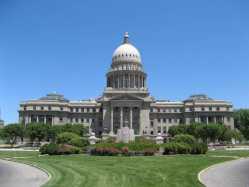Little announces 4-phase plan to reopen Idaho's economy

BOISE — Gov. Brad Little announced Thursday a four-stage plan for reopening Idaho's economy, starting with a first phase May 1 that would allow most retail establishments and places of worship to reopen, subject to strict social distancing guidelines — and would reopen much of the rest of the economy by late June.
"Our efforts are working, working to flatten the curve," Little said. "I know this is hard on everyone."
On May 1, all other current restrictions would remain in effect, including a prohibition on non-essential travel and public or private gatherings, social distancing requirements, and a 14-day self-quarantine requirement for those entering the state. The full plan is online at a new website: rebound.idaho.gov.
If Stage 1 is successful — with no spikes in COVID-19 infections — Stage 2 would begin on May 16, allowing gatherings of fewer than 10 people; and limited reopening of restaurant dining rooms, gyms and hair and nail salons with approved social-distancing plans.
If Stage 2 is successful, Stage 3 would begin May 30, allowing gatherings of between 10 and 50 people that allow for appropriate social distancing measures; allowing some non-essential travel to resume; and ending the 14-day quarantine requirement for arrivals from out of state.
If Stage 3 is successful, Stage 4 would start June 13, allowing bars, nightclubs and large venues like movie theaters to reopen, but only with appropriate social distancing measures in place. At that point, visits would be allowed to resume to nursing homes, jails and other congregate care facilities, subject to hygiene and social distancing measures.
Under the plan, Little said, "Most of the state will be open by the end of June."
"We know that we cannot reopen everything all at once, and undo all the progress," he said. The governor said his plan follows President Trump's recommendations to "safely and responsibly reopen our economy in stages."
"The intent is that everything we do in this plan is successful to where we can go back to school in the fall," Little said. "If things don't go right, if something happens … we're going to go back."
Asked if his plan anticipates a return to normal by late June, Little said, "'Somewhat normal' is a good description. We are not going to be back to normal until we have a vaccine, I've just got to be straight with the people of Idaho. … The best practices that I've talked about … are going to stay around for a long time."
He said those include maintaining physical distancing of at least 6 feet from others; wearing face coverings in public places; staying home if sick; thoroughly and frequently washing hands; covering coughs and sneezes; and disinfecting surfaces and objects regularly.
Little said he was gathering a group of business leaders to form an Economic Rebound Advisory Committee to help the state come back as the state reopens its economy.
"Opening Idaho at the right pace is critical, and the plan we are laying out will give consumers, employers and employees a concrete path to prosperity," the governor said.
Little was asked about protesters and businesses defying his orders, and whether the orders will work if they're not enforced.
He dismissed the protesters as "one or two outliers" compared to "the magnitude of what the good people of Idaho have done since we started this."
"I don't condone it in any way, shape or form," he said. "It's not fair to the competitors, it's not fair to the rest of the citizens of Idaho that are making these sacrifices."
"I trust the people of the state of Idaho, 99% of 'em, to do the right thing," Little declared. "So it's a way, way outlier."
He added, "Given the fact that out of 1.8 million people in Idaho, we've got a few of 'em that are doing that — I don't think it's a good business plan, I don't think it's good for their business. I think it's disrespectful of everybody else that's compliant with it. And I trust the consumer opinion and peer pressure to be perhaps the best cure for this."
Asked about how a group of protesters, led by Emmett resident Ammon Bundy, went to a Meridian police officer's home after the officer arrested a woman who demanded to be arrested as part of a protest in which she was trespassing at a closed city playground, Little responded, "Disgusting. Next question."
Given Lt. Gov. Janice McGeachin's public stance against some of his orders, Little was asked whether he trusted her to carry them out should he become incapacitated. He joked, "Well I'm taking really good care," then said, "no," and laughed. "I believe she will," he said. "The lieutenant governor … represents all those people that have been incredibly frustrated. … I look forward to her support and her comments after she sees this (new plan)."
Idaho Health & Welfare Director Dave Jeppesen said, "We are seeing the benefit of the vast majority of Idahoans who have followed protocols." Fewer people are showing up at Idaho emergency rooms with COVID 19-like symptoms, he said, in a "promising trend. … It really has slowed the number of folks out there, the number of folks getting infected with the virus."
Staff writers Thomas Plank and Ashley Miller contributed.
Betsy Z. Russell is the Boise bureau chief and state capitol reporter for the Idaho Press and Adams Publishing Group. Follow her on Twitter at @BetsyZRussell.
